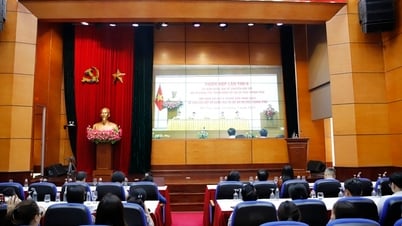 |
| Promoting the behavioral culture of famous people. (Source: Internet) |
Be careful with your statements on social media.
In modern society, celebrities are not only talented individuals in fields such as art, sports , entertainment or media, but also role models who have a profound influence on the public's awareness, attitudes and behaviors, especially young people. Therefore, the behavioral culture of celebrities is no longer a private matter, but has become an important part of the community's cultural picture. Promoting the behavior of celebrities is promoting responsibility, ethical values and exemplary role in society.
Celebrities, with their influence, can create positive waves, inspire, encourage a beautiful lifestyle, a progressive spirit, or on the contrary, cause deviations in public perception if they behave inappropriately. In many cases, just one thoughtless statement, one offensive behavior on social networks is enough to cause the image built over many years to collapse, even damaging the moral values of the young people who idolize them.
However, it cannot be denied that there are still many famous people who maintain a proper demeanor and know how to spread positive messages. Kind words, timely sharing, or practical actions for the community, no matter how small, make them a source of inspiration for a beautiful life.
Behavioral culture is a strong characteristic of each person, there should be no distinction between how we behave online and how we behave in real life. Social media, although taking up a large part of our real life interactions, is just an extension of everyday life, the rules of respect, ethics and social interaction should be applied uniformly.
Many online and offline etiquette issues are closely related. A negative online impact can have an impact on offline life and vice versa. Therefore, the process of building a culture of positive, respectful and ethical behavior needs to be applied equally to all aspects of life. In other words, etiquette should be an integral part of each person, regardless of whether they are online or offline.
Many people still think that social networks are virtual. However, this point of view also needs to be carefully considered because virtual and real are not completely separate. Social networks often reflect the real lives of users. The relationships, interactions and information shared can greatly affect their real lives.
Online interactions can have a profound impact on users’ psychology and thinking. Social pressure and online anxiety are examples of how social media can affect real life. Social media has the ability to quickly transmit information to millions of people. Therefore, online information can also have a profound impact on users’ opinions and decisions in real life.
Social media has a combination of virtual and physical aspects, impacting both the online and offline lives of its users. It is important to carefully assess its impact and manage its use to ensure that people’s real and virtual lives are taken into account.
Cultural Behavioral Adjustment
We often talk about the concept of deviation when commenting on behavioral behavior. The concept of "standard" can be understood as a level or standard that society or a specific community determines to evaluate human behavior and conduct.
Norms are often based on the values, rules, and principles that a society or community considers important and expects people to follow. For example, social norms might include mutual respect, fair social spaces, non-discrimination, and compliance with the law.
The concept of deviance arises when a behavior or conduct does not conform to or violates specific social, moral, or ethical standards set by a society or community.
However, it is important to note that the concept of deviance can change over time and according to social context. Whether a behavior is considered deviant or not can depend on the perspective of the individual and the community. Behavior is regulated by culture and morality through a number of ways such as education and teaching, role models, laws and regulations, positive social interactions, and social control.
Among these, positive social interaction and social control are important factors. Communication and social interaction within groups and communities can form and create cultural and moral understanding. People can learn from those around them about appropriate and moral behavior. We see that social pressure can be applied through criticism or isolation to those who violate moral rules and standards. Social control can effectively suppress inappropriate behavior and promote conformity.
In short, behavior is regulated by culture and morality through the formation of consciousness, providing models, building rules and standards, through social pressure and the system of laws. The combination of these factors helps shape human behavior in society.
It is important to define online etiquette. Social media and online spaces are unique and present unique challenges. Defining and promoting online etiquette is important to ensure that people can engage with social media in a safe, respectful and ethical manner.
Social media has the ability to spread information quickly and reach millions of people. Online behavior and content can spread very quickly, so there is a need for specific guidelines on how to participate and interact online. At the same time, it creates unique social pressures, including pressure about personal image and the number of online interactions. The concept of online etiquette can help users deal with these pressures in a healthy way.
Furthermore, social media has many participants, including children and vulnerable people. Having a concept of standard online behavior will help protect this group of people from unethical behavior online. The concept of standard online behavior is also related to how to manage personal information and online privacy, helping users protect their own information.
Therefore, establishing the concept of standard online behavior helps create a moral foundation and common rules for the online space, ensuring respect and safety. For each individual user, the important lesson is that each person needs to determine their responsibility for all statements on social networks to maintain a healthy online environment. Before sharing information or commenting online, each person should think about the consequences of these actions.
In addition to personal responsibility, the media and the public also need to play a role in guiding and encouraging a civilized and humane lifestyle. Excessive idolization or tolerance of uncivilized behavior is also the reason why many famous people forget their limits and responsibilities to the community.
Cultural behavior not only reflects the individual but also shows respect for the audience, for human values, and for the reputation one builds. The more attention a celebrity receives, the more careful and courageous they need to be in every word and action. When they behave culturally, they not only protect their personal image, but also contribute to building a kinder society.
Source: https://baoquocte.vn/de-cao-van-hoa-ung-xu-de-nguoi-noi-tieng-khong-lech-chuan-tren-mang-311923.html


![[Photo] President Luong Cuong receives Prime Minister of the Kingdom of Thailand Paetongtarn Shinawatra](https://vphoto.vietnam.vn/thumb/1200x675/vietnam/resource/IMAGE/2025/5/16/52c73b27198a4e12bd6a903d1c218846)

![[Photo] Prime Minister Pham Minh Chinh and Prime Minister of the Kingdom of Thailand Paetongtarn Shinawatra attend the Vietnam-Thailand Business Forum 2025](https://vphoto.vietnam.vn/thumb/1200x675/vietnam/resource/IMAGE/2025/5/16/1cdfce54d25c48a68ae6fb9204f2171a)

























![[Photo] The Prime Ministers of Vietnam and Thailand witnessed the signing ceremony of cooperation and exchange of documents.](https://vphoto.vietnam.vn/thumb/1200x675/vietnam/resource/IMAGE/2025/5/16/935407e225f640f9ac97b85d3359c1a5)





























































Comment (0)